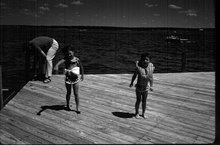
my grandmother, as I remember her
my friend, you write to me, do not let it hurt you...
but you know I am straining my eyes, striving mightily to see between the veils of time, and it hurts, my heart, my eyes, and the bleary way I wander reminds me of homeless people, and I wonder if they are similarly trapped between flickering images, faint eidetic ghosts of what once was.
You can do that with people, too, you know. I know you know. You can look into them and try to see who they have been and who they will be, the way I have peered into the faces of my children and imagined them, fully bloomed like flowers from seed, and I was always wrong, because we do not transform like flowers, no. We add layers and layers of oursleves inside and out, multiple superimpositions, and we touch each other from faraway parts of ourselves sometimes, corresponding layers that another standing next to us might not even see. And to see and see and see into one another, where the seeing never ends but opens up forever into more faded images hardly recognizable except for the vague sense of familiarity.
I have been looking for someone to divine in me an image I hold of myself, of a girl, maybe just five, singing Beethoven's Ninth, trying to bring finality to the piece, and knowing that Beethoven suffered that same affliction--the music just kept going on forever. Sometimes I have seen something vast and powerful or shockingly beautiful or terrifying in another, that has not yet been, or has long since gone.
Why are you looking at me like that?
I am looking for you. I am looking for you in you.









